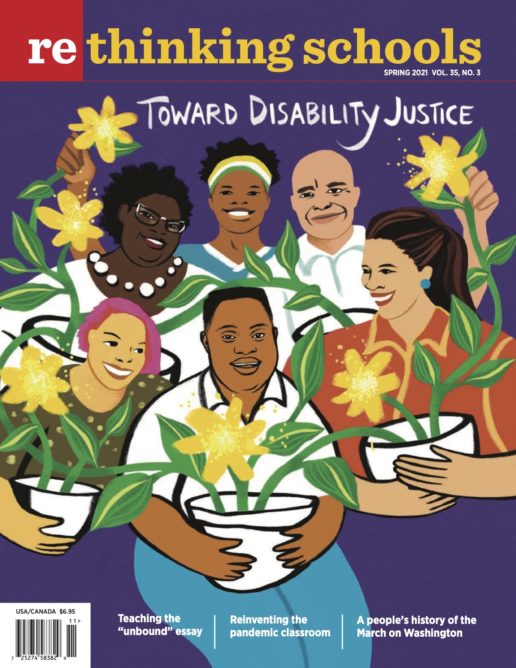Spring 2021: Our picks for books, videos, websites, and other social justice education resources.
Website
One Out of Five: Disability History and Pride Project
Designed by the Washington State Governor’s Office of the Education Ombuds in partnership with Rooted in Rights, Adina Rosenberg, and Sarah Arvey
bit.ly/One_Out_of_Five
“Somebody might act or be a little bit differently. It doesn’t mean it’s a bad thing . . . it’s more about understanding, understanding it from a different perspective.” “One Out of Five — Kenassa’s Story”
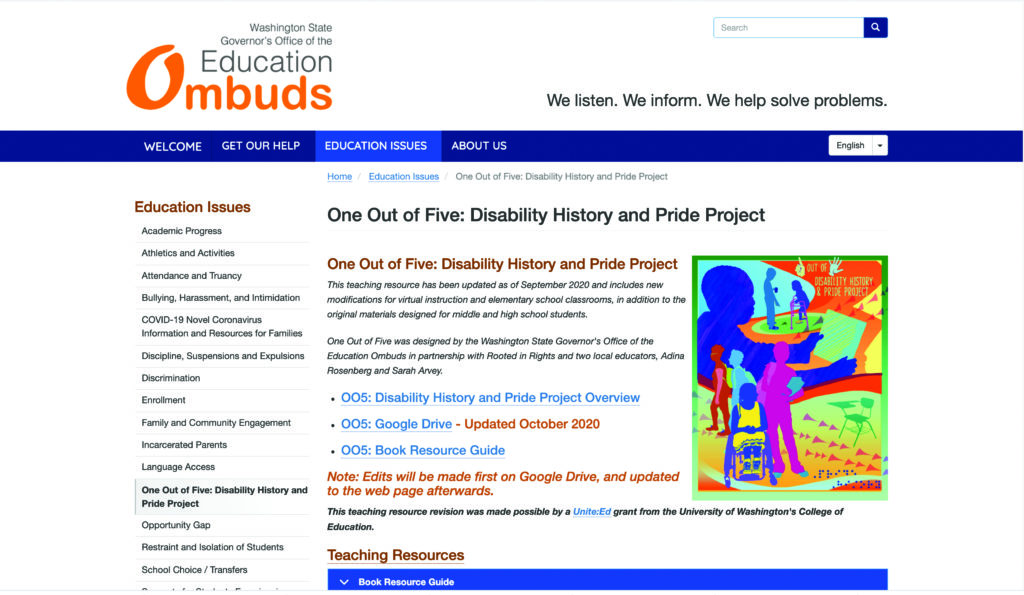
This wisdom is part of a short video in which Kenassa reflects on his disability, life, and high school experiences. The video is set against the audio backdrop of Kenassa playing piano. Other powerful student voice videos available through the One Out of Five: Disability History and Pride Project also center students with disabilities, including videos featuring 4th-grade Charlotte and 7th-grade Julian. Created to support middle and high school educators as they teach disability history and pride, the curriculum also offers video discussion guides, lesson plans, helpful links, and a book resource guide, along with virtual and elementary adaptation suggestions.
Novel
Love Is a Revolution
By Renée Watson
(Bloomsbury YA, 2021)
304 pp.
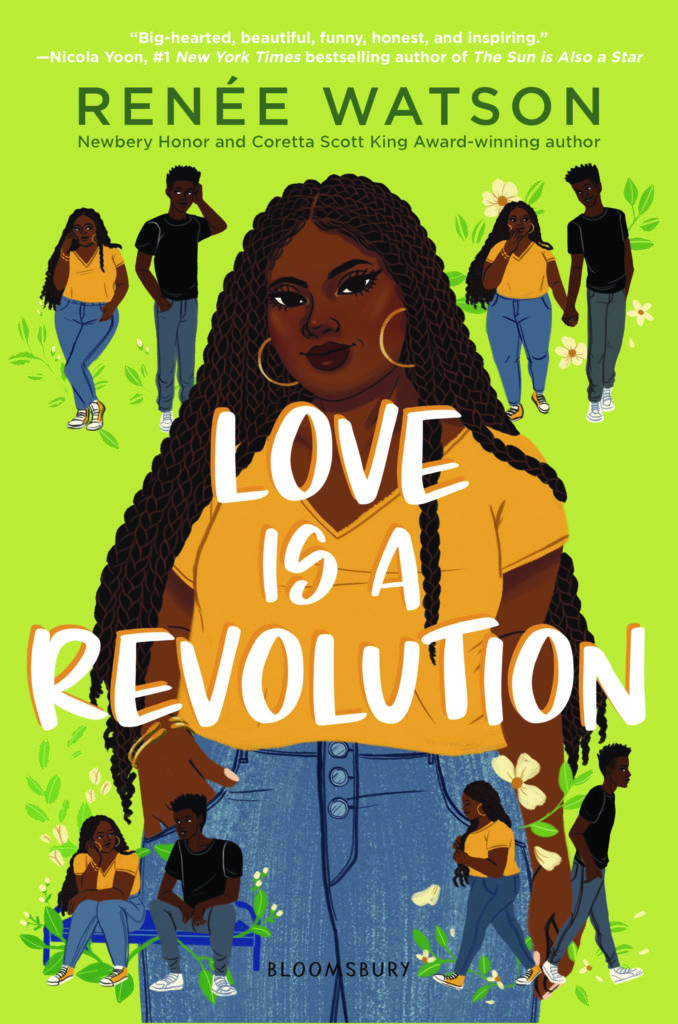
Renée Watson continues to stun readers with her big-hearted books that demonstrate the complexity of growing up young and Black and woman. Love Is a Revolution depicts the full humanity of the main character, Nala, as well as her romantic partner, Tye. But unlike many romance novels, Watson doesn’t fall prey to easy answers or traditional love story narratives. Even Bible-quoting Grandma and her Sugar Hill gang show up as activists, not just old folks nodding off in corners of a rest home. As Watson noted in a comment about the book, “I wanted Nala to exist without having to save anyone — a burden we often put on Black girls and women. Nala saves herself. And in saving herself, she is able to develop healthy, honest relationships with the people in her life.” Watson’s writing is full of nuance and texture, layering in the everyday friction that arises between friends and family members, while also exploring political and social tensions.
Curriculum
The Underground Railroad Records: Narrating the Hardships, Hairbreadth Escapes, and Death Struggles of Slaves in Their Efforts for Freedom
By William Still
Edited by Quincy T. Mills
Introduction by Ta-Nehisi Coates
(Modern Library, 2019)
384 pp.
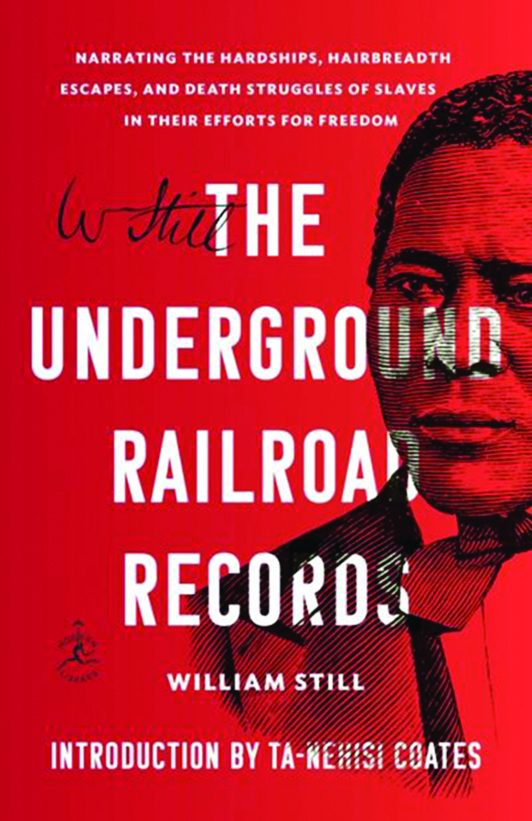
Ask your students who they associate with the Underground Railroad, and if they know any name at all, it will be Harriet Tubman. Ask them to name someone else, and they will likely come up blank. William Still, of the Philadelphia Vigilance Committee, took it upon himself to chronicle the inspiring stories of courage, imagination, self-sacrifice, and defiance that made up the continuous web of escape from slavery that we remember as the Underground Railroad. Still himself escaped slavery. The book’s narrative does not have an obvious order — it’s not chronological or thematic — but the stories Still tells will introduce students to remarkable individuals and an arena of racial justice struggle that the curriculum pays too little attention to. As Still wrote in the preface to the 1878 edition of the book, “While the grand little army of abolitionists was waging its untiring warfare for freedom, prior to the rebellion, no agency encouraged them like the heroism of fugitives. The pulse of the four millions of slaves and their desire for freedom, were better felt through ‘The Underground Railroad,’ than through any other channel.” Story after story in William Still’s volume brings these “fugitives” to life for students.
Cultivating Genius: An Equity Framework for Culturally and Historically Responsive Literacy
By Gholdy Muhammad
(Scholastic, 2020)
176 pp.
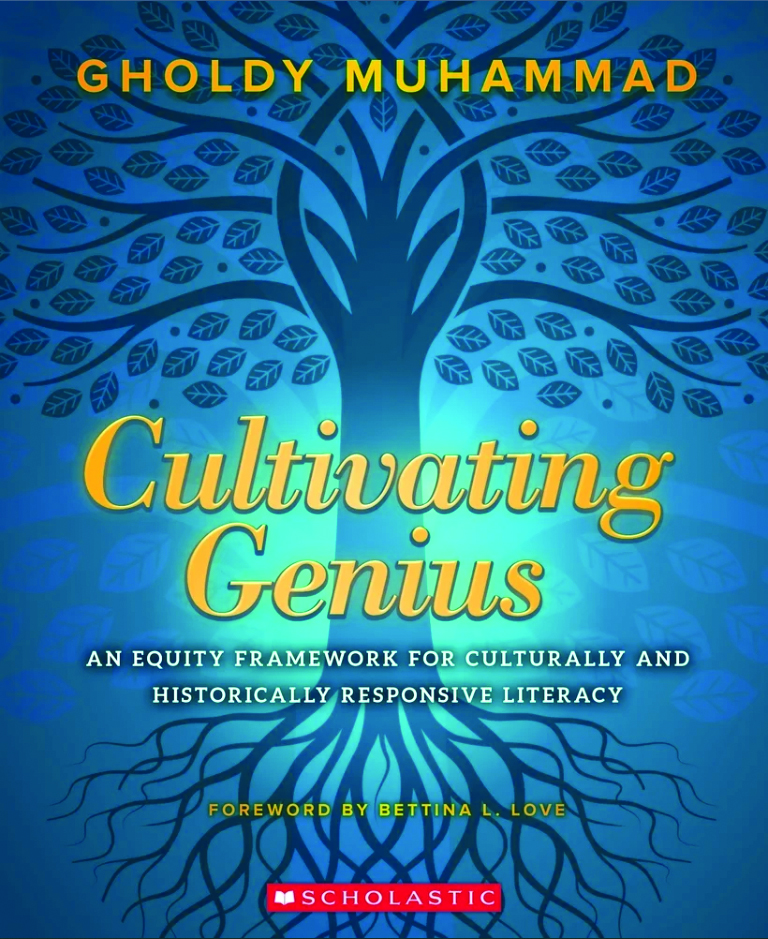
Cultivating Genius: An Equity Framework for Culturally and Historically Responsive Literacy offers a powerful lens through which to think about the teaching of literacy in grades K–12. An approachable, practitioner-focused text, this book is based in Muhammad’s research into 19th-century Black literary societies. The Historically Responsive Literacy framework she lays out is oriented around four pillars — Identity, Skills Development, Intellect, and Criticality — each historically situated in the powerful literacy practices of Black communities. Full of sample plans and concrete examples of what this framework can look like in the classroom, as well as insightful questions to prompt teacher reflections, this book will be an essential resource for novice and experienced educators alike.
The Book of Delights
By Ross Gay
(Algonquin Books, 2019)
274 pp.
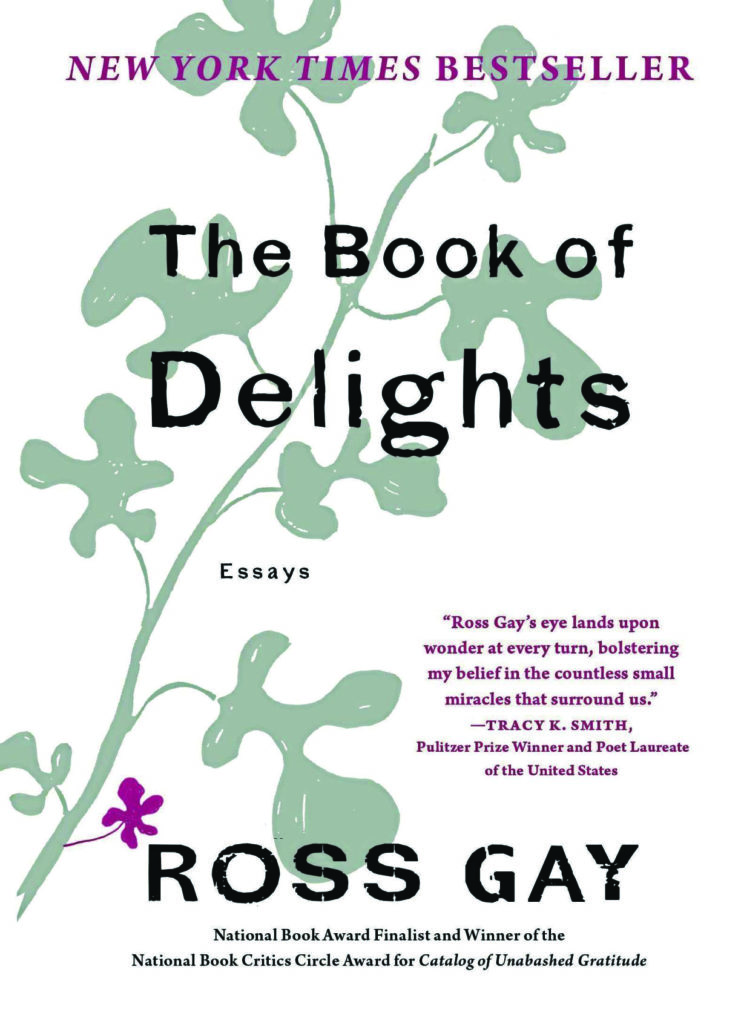
The poet Ross Gay, who many of us might have first learned of after reading his tender and devastating poem about the murder of Eric Garner, “A Small Needful Fact,” recently had an idea. He decided he would attempt to write an essay every day for a year. He set up some rules for himself that would make it an achievable goal: “write a delight every day for a year; begin and end on my birthday, August 1; draft them quickly; and write them by hand.” What are these essayettes (Gay’s word) about? The things that are often on his mind. He writes, “My mother is often on my mind. Racism is often on my mind. Kindness is often on my mind. Politics. Pop music. Books. Dreams. Public space. My garden is often on my mind.” One can imagine offering students a handful of the 102 tiny essays included in The Book of Delights to first enjoy — their brevity and their charm — and then to use as mentor texts for their own writing. These morsels assure our students: Essays have no word count minimums, paragraph sequencing, nor required prompts; most of all, they reassure, “Why not just write about what’s on your mind?”
No Planet B
A Teen Vogue Guide to the Climate Crisis
Edited by Lucy Diavolo
(Haymarket Books, 2021)
224 pp.
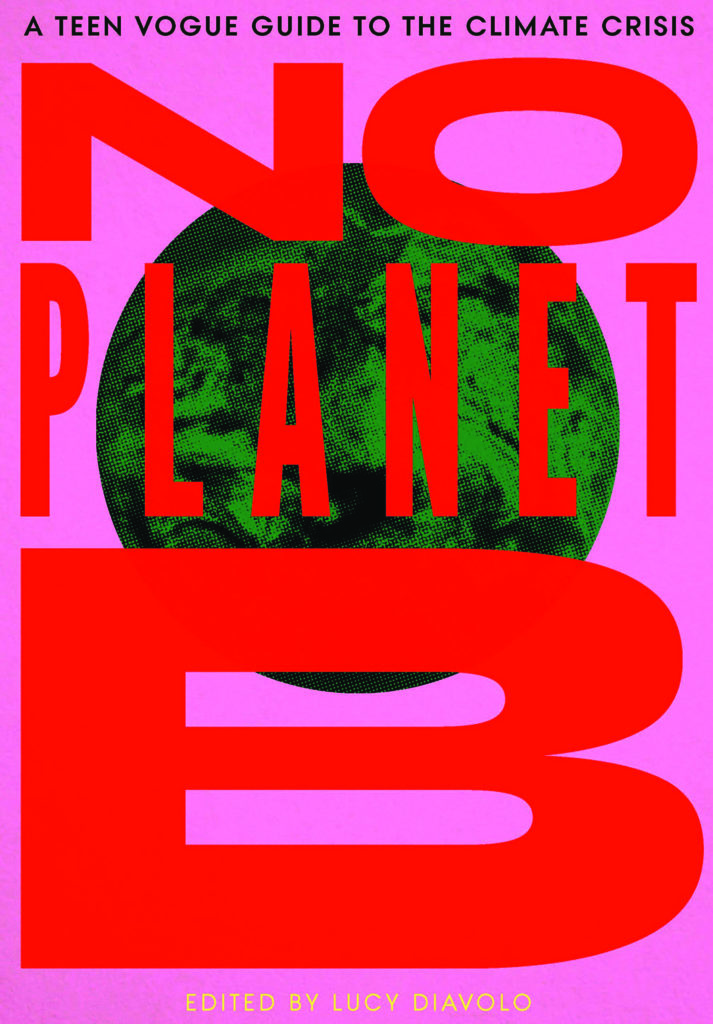
In her foreword to No Planet B, Lindsay Peoples Wagner, Teen Vogue’s editor-in-chief, writes that they hoped this book would embody “Teen Vogue’s motto of making young people feel seen and heard all over the world.” This small volume, made up of short student-friendly readings, lives up to this aspiration. It is filled with the voices of young activists and artists, ages 10 to 25. Xiye Bastida, now a Fridays for Future activist, describes her first encounter with climate chaos, growing up 40 minutes west of Mexico City in San Pedro Tultepec, her community suffering from heavy rainfall and contamination — then moving to New York City and being hit by Hurricane Sandy: “This is happening everywhere. The climate crisis follows you.” The readings — interviews, reported articles, first-person testimonies — are each just a few pages long, and offer lots of teaching possibilities. An important theme of the book is how climate change is also a racial justice issue, an immigration issue, a labor issue, a feminist issue, an Indigenous issue, and more.
Podcast
Seizing Freedom
Written and hosted by Kidada E. Williams
Seizingfreedom.com
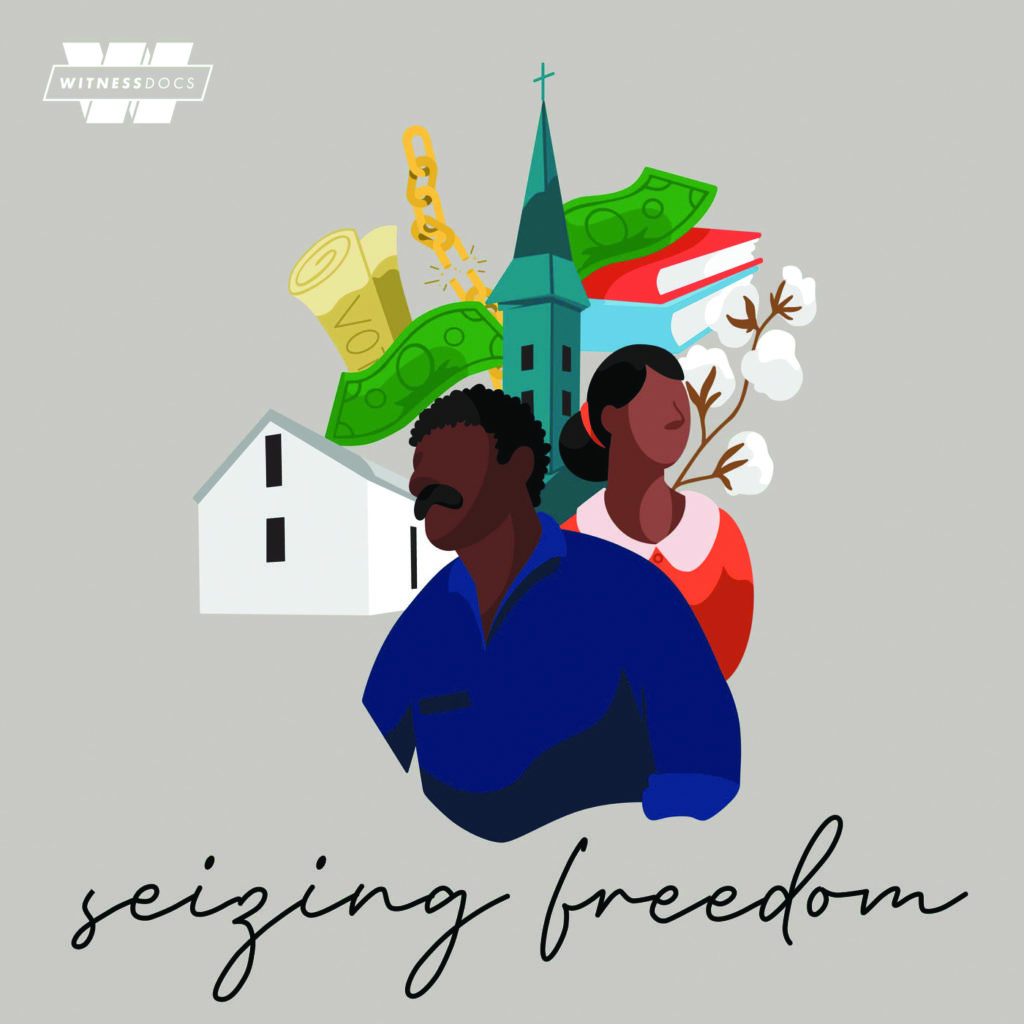
Kidada Williams describes her podcast Seizing Freedom as “the show where we dig into archives to bring you stories about how African Americans freed themselves during the Civil War and built new lives during Reconstruction . . .” As one of her interviewees, Crystal Feimster, a professor at Yale, explains: “Once you center a different set of people, it requires asking different kinds of questions. And it actually means we come up with different conclusions.” In some ways, Seizing Freedom is two podcasts: In one, Williams includes interviews that help us rethink how we “do” history when we put African Americans at the center; the other features dramatic readings about Civil War refugees who built new lives behind Union lines, enslaved people who escaped to search for and reconstruct families, Black men who demanded the right to fight slavery as Union soldiers. The first helps us become better teachers; the second provides wonderful storytelling episodes that will bring buried history to life for students. Seizing Freedom is the perfect title for a podcast about people to whom nothing was given — who fought, and continue to fight, for lives of dignity.
Reviewed by Bill Bigelow, Ursula Wolfe-Rocca, Elizabeth Barbian, Grace Cornell Gonzales, and Linda Christensen — Subscribe to Rethinking Schools at www.rethinkingschools.org/subscribe

